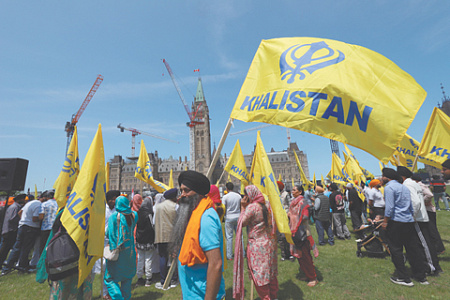
Canada has officially designated a notorious India-based criminal organization, the Bishnoi gang, as a terrorist group, adding a new and explosive chapter to a diplomatic crisis with New Delhi. The move is directly linked to the investigation into the 2023 assassination of a Sikh separatist leader on Canadian soil, a killing that Ottawa has publicly suggested was orchestrated by Indian government agents.
The international firestorm began in June 2023, when Hardeep Singh Nijjar, a prominent advocate for an independent Sikh state known as Khalistan, was gunned down outside a Sikh temple in Vancouver. The suspects arrested in connection with his murder are all allegedly linked to the Bishnoi gang. The incident took a dramatic turn when Canadian Prime Minister Justin Trudeau stood before Parliament to announce credible allegations of a link between “agents of the Government of India” and the assassination.
India vehemently denied the accusations, leading to a severe diplomatic fallout. The two nations engaged in a tit-for-tat expulsion of dozens of diplomats, effectively freezing high-level relations. The public accusation by a leader of a G7 nation against a rising global power sent shockwaves through the international community and strained ties between the two Commonwealth countries to a breaking point.
Canada’s concerns were alarmingly corroborated months later when U.S. authorities uncovered and foiled a similar assassination plot against another Sikh separatist on American soil. The U.S. case placed Washington in a delicate position, forced to balance its loyalty to its “Five Eyes” intelligence-sharing partner, Canada, with its strategic imperative to cultivate India as a key counterweight to China in the Indo-Pacific.
The allegations have reportedly engaged the entire “Five Eyes” intelligence alliance, which includes the U.S., U.K., Canada, Australia, and New Zealand. The collective weight of this powerful intelligence-sharing network has amplified the pressure on Prime Minister Narendra Modi’s government, which has consistently projected an image of India as a strong and principled global player.
The new terrorist designation by Ottawa gives Canadian authorities enhanced powers to combat the Bishnoi gang, including the ability to freeze and seize its assets. According to Canadian Public Safety Minister Gary Anandasangaree, the decision will bolster efforts to disrupt the criminal network, whose leader, Lawrence Bishnoi, is reportedly directing operations from inside a prison in India.
At the heart of the conflict is the Khalistan movement. While Indian officials have long warned that Canada harbors Sikh extremists planning unrest in India’s Punjab state, many observers note that the separatist cause has limited traction within India itself. The movement’s support is far more pronounced among the Sikh diaspora in Western nations like Canada, which is home to a large and influential Indo-Canadian community of nearly one million people.
While the terrorist designation marks a firm step by Ottawa, there are also nascent signs of de-escalation. Officials have indicated a mutual desire to resume the exchange of intelligence information, suggesting a possible, albeit cautious, path to mending the deeply fractured relationship. For now, the saga remains a complex web of organized crime, international espionage, and high-stakes diplomacy that continues to test the alliance between India and the West.
